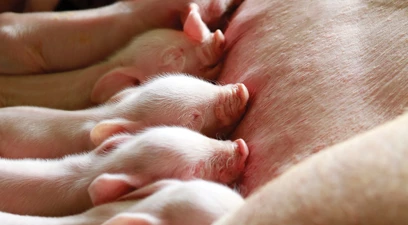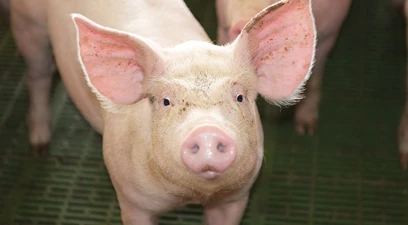Prioritising gut health to produce healthy piglets
The gastrointestinal tract plays a key role along the multitude of factors that determine pig health within every production system.
Not just responsible for feed digestion and nutrient absorption, the gut also houses more than 70% of immune cells. As such, the intestinal lining is crucial in maintaining pig health by serving as a strong barrier and functional interface between internal body systems and pathogens within the gut, explains Georgina Phillips, technical sales specialist from Phileo UK & Ireland.
“The integrity of the gut relies on several structural components,” she says. “The intestinal epithelium is made up of a single layer of cells closely connected by proteins named tight junctions, which maintain the barrier’s selectivity. These epithelial cells cover tiny, finger-like projections called intestinal villi, which greatly increase the surface area of the gut, allowing pigs to absorb and utilise the most they possibly can from feed.”
Weaning stress and immune vulnerability
Weaning represents a major stressor as piglets must adapt to a new environment and consuming only solid feed, which often results in reduced feed intake and gut barrier dysfunction.
“Research shows that up to 50% of gut absorptive area can be lost in the first five days post-weaning,” Georgina continues. “This means piglets lose significant capacity to extract energy and nutrients that could have been used for growth or invested into immunity or other bodily functions.”
Socialising with new litter mates at weaning also exposes piglets to new sources of disease. This often includes enteric pathogens like E.Coli and Salmonella, which can adhere to and significantly damage the gut lining.
Subsequent disruption of tight junctions creates space between epithelial cells, increasing intestinal permeability and allowing the passage of bacteria or toxins to enter the pig’s blood circulation and cause inflammation – also known as ‘leaky gut’.
“More often than not, leaky gut syndrome is the cause of post-weaning diarrhoea, a major cause of piglet mortality,” she explains.
“Supporting the piglet’s disease defences at weaning is therefore paramount to ensure not only piglet survival, but subsequent growth performance. Similarly, stress is known to increase gut permeability, leading to a double-edged challenged for piglets.”
Targeted nutritional strategies to support gut health
“It is important to consider how pig health can be influenced through nutrition, in combination with proper management and biosecurity regimes,” she stresses.
“First and foremost, producing robust piglets largely depends on the health and nutrient status of the sow. Passive immunity from the sow’s colostrum only offers so much protection – meaning that post-weaning, piglets must rely on the activation of their own immune system which is still developing.
“Therefore, feeding sows with the goal of maximising colostrum production and immunoglobulin content is fundamental to protect piglets, but supporting the piglet’s own immune competence is also vital for achieving resilience in the face of disease.
“Secondly, gut morphological structures undergo rapid development during the first few weeks of a piglet’s life, particularly upon ingestion of solid creep feed in preparation for the weaning transition. Providing creep with good quality, highly digestible feed ingredients in the farrowing house will encourage feed intakes, despite the stress of weaning, and maintain proper gut development and functionality.”
Gut health can also be optimised by ensuring that feed contains high quality ingredients. Live yeast probiotics like Actisaf® Sc 47 can be included in both sow and piglet diets to balance the gut microbiome in favour of beneficial bacteria, aiding the digestion of dietary fibre and outcompeting undesirable pathogens.
Yeast-derived postbiotics like Safmannan® contain high levels of highly specific functional carbohydrates to support gut integrity. Namely, alpha-mannans have a strong binding affinity for gram negative bacteria – often the cause of disease outbreak on farm – removing them from the digestive tract altogether and preventing colonisation.
When supplemented at weaning, beta-glucans also help prime the gut-associated immune system, enhancing the piglet’s natural defences.
If gut integrity is preserved during the weaning period to maintain growth and development, this can set piglets up for success later in life. A well-developed intestinal barrier supports effective immune development, pathogen resistance, feed digestion and ultimately, lifetime performance.
“By taking a holistic approach to gut health and addressing the nutritional, microbial, environmental and managerial elements that affect it early in life, we can ensure the sustainable production of robust and profitable pigs,” she concludes.
Related Tech Info

The loss of zinc oxide as a tool against digestive disorders has left many farmers concerned about how to manage pig health i...

A trial in the Republic of Ireland found that piglets supplemented with Actisaf® live yeast and Safmannan® premium yeast frac...
